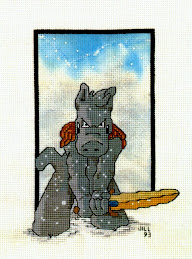
Jonathan Stroud’s Bartimaeus; the wise cracking fourth level djinn, first appeared in the Bartimaeus trilogy (The Amulet of Samarkand, The Golem’s Eye & Ptolemy’s Gate) in 2003. The YA trilogy was extremely successful and was enjoyed by both its intended audience and adults alike. Since wrapping up the trilogy with Ptolemy’s Gate in 2005, the author has worked on other YA projects. I hadn’t heard anything about another Bartimaeus book in the pipeline, but as I found the trilogy a lot of fun I was very happy to see The Ring of Solomon.
The Bartimaeus books are set in an alternate history where magic, magic users and various magical entities, including spirits (imps, djinn, afrits, etc…) are active and almost common place. The Ring of Solomon is referred to as a prequel to the original trilogy, concerning the djinn’s activities in Solomon’s Jerusalem circa 950 BC.
Bartimaeus’ master was tricked into breaking the barriers that protected him from his magical servants and was subsequently eaten, as punishment Solomon gave Bartimaeus and a number of his fellow djinn (including Faquarl who will be familiar to readers of the original trilogy) to Khaba the Cruel; a magician renowned for his ability to tame difficult djinn. By accident Bartimaeus saves the life a young female assassin; Asmira, who entreats Khaba to free the djinn. Khaba takes the opportunity to rid himself of the thorn in his side that Bartimaeus has become, but only succeeds in making even more of an enemy of the djinn, who teams up with Asmira to gain control of Solomon’s fabled ring; the source of his power.
The style that Stroud employed for the trilogy was to tell the Bartimaeus chapters in first person and chapters concerning other characters, or using their point of view, were related in third person. The same applies for The Ring of Solomon. As always, the Bartimaeus chapters were the most entertaining, and the funniest. The djinn has a very amusing, boastful spin on things and he footnotes most of his chapters extensively. The footnotes are often the funniest thing about them, as well as helping to establish the alternate history in which the books are set. Stroud has said that Bartimaeus is his favourite character to write and it shows, both writer and readers have a huge amount of fun with him.
I was both delighted and concerned when I first saw the book. Delighted because I enjoyed the first 3 books and wanted to know more about Bartimaeus. Concerned because I felt by the end of Ptolemy’s Gate the spark had largely gone from the story and maybe there wasn’t a lot more Bartimaeus had to share. Too often these days I find authors go back to their most popular creations and disappoint the second time around. I need not have worried, changing the setting to an Arabian Nights type story injected a good deal of freshness into the concept and the character of Bartimaeus himself, the 5 year gap between stories probably also helped readers to remember him fondly and eagerly accept a new story of his adventures. Although The Ring of Solomon is described as a prequel it’s really a standalone story set in the same world and with some recurring characters. It can be easily read with no knowledge of the trilogy and it’s open ended enough that if Jonathan Stroud wishes to share more of Bartimaeus’ dealings in the human world with his readers then he can do so.
I was a fan before and this book ensured that I will remain one. Heartily recommended to anyone who wants a laugh and likes their fantasy on the funny side.


No comments:
Post a Comment